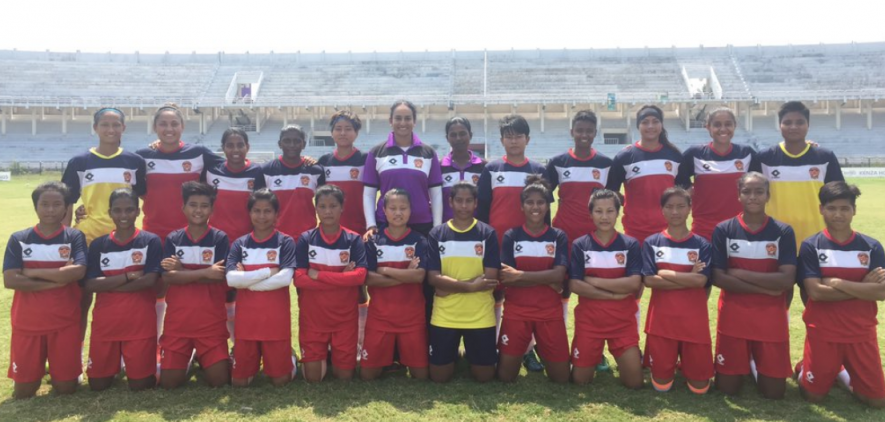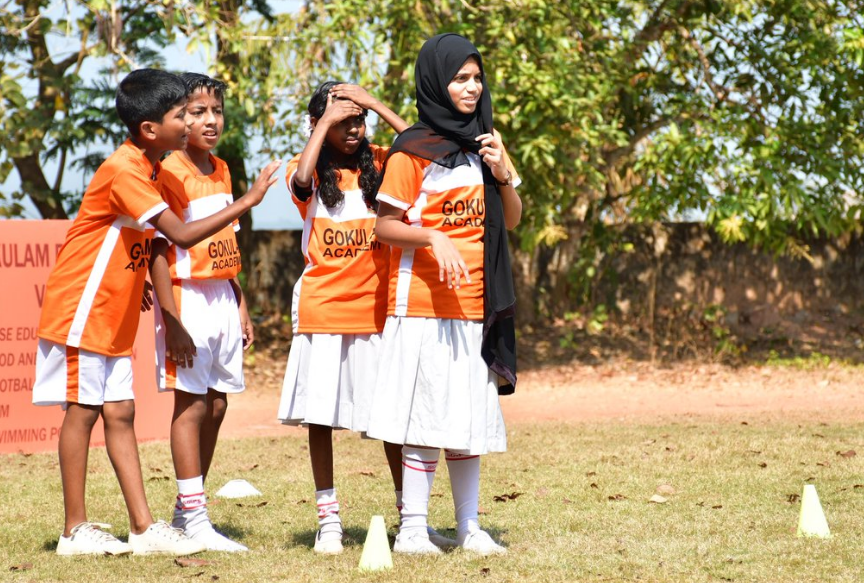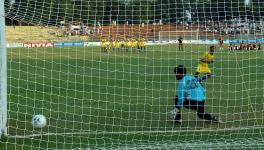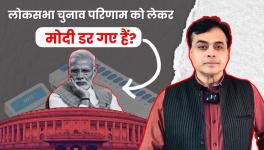IWL 2019: Gokulam FC and the Kerala Football Conundrum

Gokulam Kerala FC’s team, which reached the semifinals of the 2019 Indian Women’s League (IWL 2019), had five India internationals, and players from Haryana, Manipur and Delhi, but none from Kerala.
“I get a lot of calls every month from players across different districts asking about trials for the team. Across Kerala everyone knows about Gokulam being a club for women’s football, and seeing how committed the president is, we can hope this sustains in the future,” PV Priya says.
Priya is the coach of Gokulam Kerala FC, the only club from the Indian Super League (ISL) or the I-League to field a team in the Indian Women’s League (IWL 2019) this year. And despite a semi final exit — not bad for a team that finished fifth of seven last year — Priya is satisfied. As she sees it, despite the lack of time for a full camp, the mixed identities of their players and the hurried manner in which they have been integrated into a team unit, their ability to pull themselves to within 45 minutes of a final is a commendable effort.
Also Read | Bala Devi’s Goals, Sethu FC’s Might, Gokulam Kerala’s New Life
Gokulam conceded just the one goal through the group stage of the competition. Unlike the two finalists, Manipur Police and Sethu FC, they haven’t been dependent on the one player to bail them out either. Their 16 goals in the group stage were scored by eight different players. That’s testament to the group’s cohesion in an otherwise star-driven league. With five India internationals on their roster, and a coach with experience at the national level, all of this to be expected. As the CEO of the club, Ashok Kumar, says, this was the plan all along, not to just put out a team for competition but to actually challenge for the title.
Even off the field, Gokulam, for a variety of reasons, deserve to hold their head high. The inclusivity of their club’s structure, the team’s young bright demeanour and the management’s desire to put out a ‘futuristic’ option for women’s football has garnered a lot of praise amongst football enthusiasts. In a male dominated game, Gokulam’s desire for an equal gender playing field is a breath of fresh air.
Despite all the plaudits, there is more to come. And to hear everyone associated with the club tell it, there is much to be done. To start off, the first task is simple. Integrate local players into a team that currently has none.
Most of the criticism for Gokulam — admittedly online and most often on the live feeds of their games — is fans complaining incessantly about the lack of local players in their squad. In their opener, when they beat the defending champions Rising Student Club 5-0, the chatter online was entirely centred around this. The manner of Gokulam’s play, the considerable inexperience within their own squad, the brilliance of their coaching staff in harnessing variant elements into a cohesive structure in a limited time frame, the limited opportunities for women footballers in India were disregarded for debate.
Video | Maymol Rocky: Indian Women's Football's Present Sense, Bright Future (420 Grams)
The simple facts were considered. RSC played a team almost exclusively based in two districts of Odisha, with an average age closer to the teens. Gokulam had five India internationals on their roster, and players from regions as far as Haryana, Manipur and Delhi. But none from Kerala.
For CEO Ashok Kumar, this topic is pertinent, but also unsolvable in the short term. “With respect, unfortunately, the state of the women’s game is such, that the demand is more than the supply. There is a dearth of players in the country, and it is too much to ask one club to fix it,” he says.

Gokulam Kerala FC womenâs team coach PV Priya feels the way forward for the state is to include girls in the many grassroots academies, letting them learn the basics and play the game alongside the boys.
His response is measured. “I agree it is an absurd situation for us, but while it saddens us, there is little we can do to fix it in the short term,” he adds. “Kerala has a lot of academies and clubs mushroomed across the state. But Gokulam is the only team that has come and fielded a team in the IWL. By my count, there are about 1600 academies in Kerala, but for what use, if we can’t produce players. Every D-license holder now has an academy. This is a commercial endeavour. There is no desire to create a development model that is sustainable. And that is why we are here today.”
To him, it seems that the free hand given to academies and football schools is an impediment to actual football development in the state and the country. It is an ailment that he would love to see eradicated from the system.
Priya adds, “Even at the grassroots, academies, centres for football don’t include girls,” she says. “I’m not asking for segregated, separate academies, just to be clear. But even if they can get a few girls in every age group, let them play with the boys at the younger age groups, that will itself help.”
Video | India footballers Aditi Chauhan and Dalima Chhibber @420 Grams
The difference in conversations about football is stark. In the lead up to the FIFA Women’s World Cup in France, which kicks off on June 7, the focus is on equal pay and equal visibility. In India we are still miles away from equal opportunity. Just opportunity. Any opportunity.
Sample this: The AIFF, based on publicly available data, invested Rs. 2.39 crore on the women’s national team in 2017-18 and Rs. 9.3 crore under the vaguely titled ‘Competitions’, which presumably also include women’s football. That women’s football in India is in need of a systemic change is undeniable. State associations have been famously lax in their promotion of women football — a fact enhanced by the manner in which the Junior Nationals were conducted, where teams were given minimal time to put together a team — some deigned to participate citing the time not enough. Newsclick reached out to the Kerala Football Association (KFA) General Secretary, Anil Kumar, and mailed him questions about Kerala’s grassroot programme for football but received no response.
Bino George, Technical Director for Gokulam sees another impediment in his state’s vision for football.
“In Manipur, football is the most popular sport. But in Kerala, a lot of young kids, boys and girls, go into athletics,” he says. “Whenever you have any athletics event, you would always see that Kerala is the state that brings in a lot of medals for the country. The likes of Muhammad Anas, PT Usha, PU Chitra have all done our country proud.”
The main challenge, Bino says is to draw these athletes towards football. Coaching, and availability of good training is foremost for this to happen. “Our duty would be to teach the kids technique, and tactics. Basic attributes like speed or strength will already be with them since they have been into athletics,” he says.
Priya also notes that across the junior levels there are teams and opportunities for girls to play basketball or volleyball but very few schools offer women football. “Parents are also reluctant to let their girls play football. For various reasons this is changing now, but the system around also has to evolve…” she says.
Also Read | Dutee Chand Reveals She's in Love with Another Woman; Here's Why it Matters
For women footballers there is, at best, the opportunity to play one month of professional football. The vast majority remain amateur. Their only hope of playing and subsisting is by getting a sports quota job in a government department. “The guarantee of a job to fall back on, or even as an incentive makes an immense difference. Volleyball, basketball teams exist. But because a lot of state departments don’t have women’s teams, the slots for women footballers are scarce,” says Priya.
Priya cites this as one of the chief reasons for the slide in Kerala women’s football in the last decade. Till 2006, the state was challenging the likes of West Bengal, Odisha and Manipur at the national level. The slide, though, has been dramatic. From being one of the contenders, Kerala struggle to get out of the group stages now. At the Senior Women’s Nationals, in September last year, they lost the one game they played to Punjab 6-1.
“One of the root causes is the lack of school level tournaments in the state,” says Priya. “In my view, school tournaments, district tournaments, and then building from them upwards is the correct method, but nothing of this sort exists right now.”
Also Read | Igor Stimac Appointed New Coach of Indian Men’s Football Team
Over the past two years, though,there has been an upward movement for women’s football in the state. At the junior level there is a storm brewing. The school tournaments have risen again. And Kerala now sends teams to compete in the Subroto Cup. The evidence of improvement can be gleaned from the fact that their junior team won two of three matches in the group stage at the nationals this year. Their sole loss, to Mizoram, put them out of contention for a knockout berth. One of the teams they beat was Punjab, a 2-0 victory.
For Gokulam, and Priya, it’s now time to take stock and find ways to channelise the mini-revival into something more concrete. “We have had a good season all round,” Priya says. “Now it is time to go back, take stock and convince everyone that we have to think in the longer term. Players have been tied to long contracts. That is one. We have to think of age-group teams, perhaps even an academy of our own. Lots of people have come forward and enjoyed the league this season. Like I said, people constantly call asking for a team tryout. Now, hopefully more…” she laughs.
And for the league, a fledgling that is trying to find its shape and form, Gokulam present a possible way forward. One based on dignity, passion and the basic understanding that football is a sport for all.
Get the latest reports & analysis with people's perspective on Protests, movements & deep analytical videos, discussions of the current affairs in your Telegram app. Subscribe to NewsClick's Telegram channel & get Real-Time updates on stories, as they get published on our website.
























